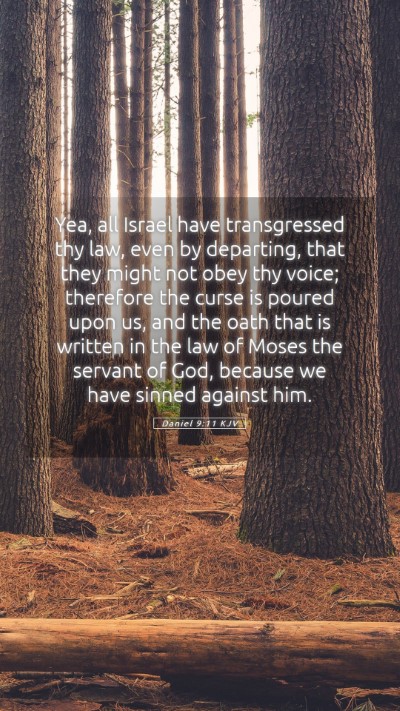Understanding Daniel 9:11: A Comprehensive Analysis
Daniel 9:11 provides a profound insight into the themes of sin, judgment, and restoration within the context of Biblical prophecy. This analysis will pull together insights from various public domain commentaries, including Matthew Henry, Albert Barnes, and Adam Clarke, to give a well-rounded interpretation of the verse.
Bible Verse
"Yea, all Israel have transgressed thy law, even by departing, that they might not obey thy voice; therefore the curse is poured upon us, and the oath that is written in the law of Moses the servant of God, because we have sinned against him." (Daniel 9:11)
Verse Breakdown and Summary
- General Context: Daniel is praying on behalf of the people of Israel, acknowledging their sins and pleading for God's mercy.
- Sin and Transgression: The text highlights the collective nature of Israel's sin, emphasizing that all have sinned and turned away from God's commandments.
- The Curse: This refers to the consequences of breaking God's law, which are detailed in the Torah (the first five books of the Bible), specifically in the blessings and curses outlined in Deuteronomy.
- Moses' Law: By referencing the law of Moses, Daniel invokes the seriousness of divine covenant and the ramifications of disobedience.
Insights from Public Domain Commentaries
Matthew Henry's Commentary
Henry emphasizes the collective responsibility of Israel in their transgressions against God's law. He notes that this acknowledgment is crucial for repentance, and underscores that the curse mentioned is a direct consequence of their rebellion. Henry points out that admitting fault is the first step towards restoration, corresponding to the theme of accountability that runs through scripture.
Albert Barnes' Notes
Barnes elaborates on the implications of "departing" from God’s voice. He interprets this departure not only as disobedience but as a conscious choice made by the people. This choice results in a communal downfall, where individual choices collectively impact the entire nation. Barnes also highlights the role of God's justice, in that the curses from the law are not arbitrary but are a reflection of God's holiness and righteousness.
Adam Clarke's Commentary
Clarke offers insight into the historical context of Israel at the time of Daniel's prayer. He reflects on the broader narrative of Israel’s captivity and how their sins led to their exile. Clarke suggests that the acknowledgement of sin and the accompanying reflections on past transgressions are critical for understanding God’s redemptive purpose for His people.
Theological Significance
The importance of this verse cannot be overstated when considering the overarching narrative of the Bible. It highlights themes of sin, judgment, and the hope for restoration. The acknowledgment of sin is akin to a spiritual awakening for the people. As believers and scholars engage in bible study insights, this verse encourages deep reflection on the nature of sin and the grace that follows genuine repentance.
Application in Daily Life
This verse serves as a reminder for individuals and communities alike regarding the necessity of self-examination in light of God’s Word. It challenges believers to consider their own lives and the collective actions of their communities in relation to scriptural commandments. The call to repentance is as relevant today as it was in Daniel's time, prompting questions about how we individually and collectively heed God's voice.
Related Bible Cross References
- Deuteronomy 28:15-68: The blessings and curses as consequences of obeying or disobeying God’s commandments.
- 2 Chronicles 7:14: The call for humility and prayer for healing during a time of national sin.
- Romans 3:23: "For all have sinned, and come short of the glory of God," emphasizing the universal nature of sin.
- 1 John 1:9: The promise of forgiveness upon confession of sins.
- Psalm 51:1-4: David’s penitential psalm demonstrating the spirit of repentance.
Conclusion
Daniel 9:11 serves as a critical verse within the framework of Biblical exegesis, offering ample opportunity for bible verse commentary and scripture analysis. Its teachings resonate through both Old and New Testaments, encouraging both individual and communal reflection upon God’s laws and the call to return to Him. Through this understanding, believers can find hope and guidance in their spiritual journey.


